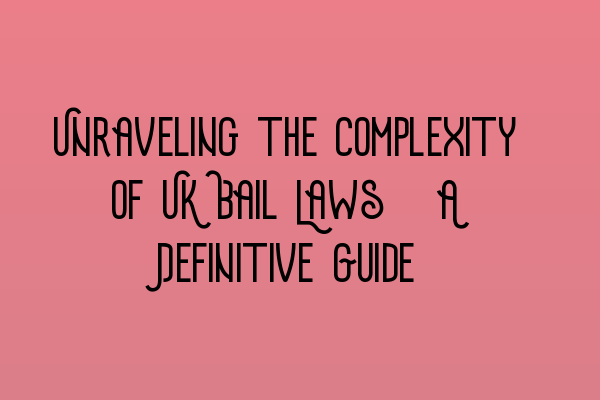Unraveling the Complexity of UK Bail Laws: A Definitive Guide
When it comes to the criminal justice system in the United Kingdom, one aspect that often puzzles both legal professionals and the general public is the complex set of bail laws. Understanding the intricacies of these laws is crucial for anyone involved in criminal law practice, as it can have a significant impact on the outcome of a case. In this definitive guide, we will demystify UK bail laws and provide you with the essential information you need to navigate this complex area.
What is Bail?
Before delving into the specifics of UK bail laws, let’s start with the basics. Bail refers to the temporary release of an individual who has been arrested or charged with a crime, with the understanding that they will return for their court proceedings. The granting of bail allows individuals to be released from custody during the trial process, provided they meet certain conditions set by the court.
Now, let’s explore some of the key aspects of UK bail laws:
1. Types of Bail
In the UK, there are various types of bail that can be granted to an individual, depending on the circumstances of the case. These include:
- Conditional Bail: This type of bail comes with specific conditions that the individual must adhere to, such as regularly reporting to the police, surrendering their passport, or staying away from certain individuals or locations.
- Unconditional Bail: This form of bail is granted without any conditions attached. The individual is simply released from custody and is free until their court proceedings.
- Police Bail: When a suspect is arrested but not immediately charged, the police may grant them bail. This allows them to be released from custody while the investigating process continues.
- Surety Bail: In certain cases, the court may require a surety – a person who takes responsibility for ensuring that the individual attends court – to provide a financial guarantee.
2. Considerations for Granting Bail
When considering whether to grant bail to an individual, the court takes several factors into account:
- The seriousness of the offense: The more serious the crime, the less likely the court is to grant bail.
- The individual’s criminal record: A history of previous offenses may influence the court’s decision.
- The likelihood of the individual absconding: The court will assess whether there is a high risk of the individual failing to attend their court proceedings.
- The potential threat to public safety: If there is a concern that the individual may pose a danger to the public, bail may be denied.
3. Breaching Bail Conditions
If an individual violates their bail conditions, they may face severe consequences. Breaching bail conditions can lead to immediate re-arrest, revocation of bail, and potential additional charges.
Stay Informed and Prepared with SQE Criminal Law & Practice Law UK
To navigate the complexities of UK bail laws and excel in your criminal law practice, it is essential to stay informed and continually update your knowledge. At SQE Criminal Law & Practice Law UK, we offer comprehensive SQE 2 Preparation Courses and SQE 1 Preparation Courses designed to equip aspiring solicitors with the skills and knowledge they need to succeed.
Whether you’re a law student preparing for the SQE exams or a practicing solicitor seeking to enhance your expertise, our courses are tailored to meet your specific needs. From SRA SQE Exam Dates to SQE 1 Practice Exam Questions, our comprehensive resources are designed to help you succeed in every aspect of the SQE exams.
Ready to unravel the complexities of UK bail laws and enhance your criminal law practice skills? Enroll in our SQE preparation courses today and take the first step towards a successful legal career.
